Mick Whelan
23rd September, 2022


Mick Whelan is chair Labour Unions, the organisation representing the 11 unions affiliated to the Labour Party, general secretary of ASLEF and a member of Labour's national executive committee.

© 2017 Andrew Wiard, www.andrew-wiard.com,
www.reportphotos.com
Austen Chamberlain, Chancellor of the Exchequer under Arthur Balfour and David Lloyd George and Foreign Secretary under Stanley Baldwin, said that a friend – a British diplomat in China – had told him that an old Oriental curse is: “May you live in interesting times.” Now that expression – which might not be quite as authentic as Neville Chamberlain’s half-brother would have had us believe – has nonetheless enjoyed a long half-life, and came to mind this summer as we witnessed the last days of the Johnson empire and the first tricky hours in power of lucky Liz Truss.
I note, incidentally, that when the new Prime Minister first addressed the nation, she mentioned road twice but rail not once. For every one of us who works on or uses the railway network in this country – moving passengers and freight around the UK – that is very disappointing, if perhaps not surprising. And Anne-Marie Trevelyan, the new Transport Secretary, is a climate change sceptic who claimed in the face of all the evidence that “we aren’t getting warmer, global warming isn’t actually happening” when we all know, actually, that it is. To appoint a Transport Secretary who doesn’t appreciate why having a green, and sustainable, transport system is so important – not just to Britain, but to the world – does not fill us with hope for the future! We are, indeed, living in interesting times…
But some things don’t change – and these include the aims of my trade union, which are quite clear and enshrined in our rule book. ASLEF exists to: “Secure the best terms and conditions for train drivers, to negotiate on behalf of our members with the train and freight companies, to promote a pride in the job we do, to champion equality in our industry, and to work for a fairer, more just, and more equitable society. A socialist society.” That’s what we want. A Labour government committed to socialist values. And that includes bringing back into public ownership the key parts of the British economy that should properly belong to the British people.
Britain’s railways were nationalised in 1948 by Clement Attlee’s great reforming post-war Labour government, which brought the UK’s strategic heavy industries and our key public utilities into the public sector. Partly, because the private sector had failed. Partly, because the Labour government had to rebuild a shattered economy after the Second World War. And, partly, because they wanted to remake Britain as a better and fairer country that worked properly for everyone.
“The Labour Party is a socialist party, and proud of it.” That was what it said in the election manifesto of 1945 and Labour won a landslide because of it: 393 out of 640 seats in the House of Commons (the Tories got just 210) with 47.7% of the vote.
The Labour Party was forged in the furnace of the labour movement. Trade union activists, met with representatives from the Independent Labour Party, Social Democratic Federation and Fabian Society in 1900 to set up the Labour Representation Committee. They approved a plan, proposed by Keir Hardie, to get ordinary people into parliament to “promote legislation in the direct interests of labour” – meaning working-class men and women impatient for better pay and working conditions, proper holidays, decent pensions and unemployment benefit.
LRC candidates won two seats at the general election of 1900, 29 in 1906 – when its MPs changed its name to the Labour Party – and, 18 years later in 1924, formed its first government under Ramsay MacDonald, the illegitimate son of a farm labourer and a housemaid.
Morgan Phillips – a colliery worker from Aberdare in the Rhondda who, as general secretary of the Labour Party, played a key role in those general election victories of 1945 and 1950 – reckoned that our party “owes more to Methodism than Marxism”. Which might be right. But Harold Wilson, at the Scottish Labour Party conference at Rothesay in 1964, argued persuasively: “The Labour Party is a moral crusade – or it is nothing.”
I am proud to be a member of the Labour Party, proud to be an active trade unionist and proud to be chair of Labour Unions, which used to be called TULO, and represents the trade unions – including Unite, UNISON, the GMB, CWU and USDAW – which affiliate to our party. The Labour-union link is not just an historic relationship – since the labour movement, 122 years ago, formed the Labour Representation Committee which became the Labour Party – but a successful relationship, which I believe passionately will help the party to get into government at the next general election.
That’s why I find it utterly extraordinary that, in July, the leader of the Labour Party, sacked a shadow transport minister for standing on a picket line at Euston station in support of working people who are trying to protect their jobs, their pensions and their terms and conditions – and who have the temerity to an ask for an increase in salary to keep pace with the rise in the cost of living. If Labour does not believe in these things – in all of those things – then what does the party stand for?
The Labour Party needs to stand shoulder to shoulder with working people, and show real solidarity with trade union members as the cost-of-living crisis deepens. Because we are one movement – the Labour Party and the labour movement – and we forget that at our peril.
Related
Unite: “Madcap” plan to crackdown on unions from Truss a “declaration of war”
Austen Chamberlain, Chancellor of the Exchequer under Arthur Balfour and David Lloyd George and Foreign Secretary under Stanley Baldwin, said that a friend – a British diplomat in China – had told him that an old Oriental curse is: “May you live in interesting times.” Now that expression – which might not be quite as authentic as Neville Chamberlain’s half-brother would have had us believe – has nonetheless enjoyed a long half-life, and came to mind this summer as we witnessed the last days of the Johnson empire and the first tricky hours in power of lucky Liz Truss.
I note, incidentally, that when the new Prime Minister first addressed the nation, she mentioned road twice but rail not once. For every one of us who works on or uses the railway network in this country – moving passengers and freight around the UK – that is very disappointing, if perhaps not surprising. And Anne-Marie Trevelyan, the new Transport Secretary, is a climate change sceptic who claimed in the face of all the evidence that “we aren’t getting warmer, global warming isn’t actually happening” when we all know, actually, that it is. To appoint a Transport Secretary who doesn’t appreciate why having a green, and sustainable, transport system is so important – not just to Britain, but to the world – does not fill us with hope for the future! We are, indeed, living in interesting times…
But some things don’t change – and these include the aims of my trade union, which are quite clear and enshrined in our rule book. ASLEF exists to: “Secure the best terms and conditions for train drivers, to negotiate on behalf of our members with the train and freight companies, to promote a pride in the job we do, to champion equality in our industry, and to work for a fairer, more just, and more equitable society. A socialist society.” That’s what we want. A Labour government committed to socialist values. And that includes bringing back into public ownership the key parts of the British economy that should properly belong to the British people.
Britain’s railways were nationalised in 1948 by Clement Attlee’s great reforming post-war Labour government, which brought the UK’s strategic heavy industries and our key public utilities into the public sector. Partly, because the private sector had failed. Partly, because the Labour government had to rebuild a shattered economy after the Second World War. And, partly, because they wanted to remake Britain as a better and fairer country that worked properly for everyone.
“The Labour Party is a socialist party, and proud of it.” That was what it said in the election manifesto of 1945 and Labour won a landslide because of it: 393 out of 640 seats in the House of Commons (the Tories got just 210) with 47.7% of the vote.
The Labour Party was forged in the furnace of the labour movement. Trade union activists, met with representatives from the Independent Labour Party, Social Democratic Federation and Fabian Society in 1900 to set up the Labour Representation Committee. They approved a plan, proposed by Keir Hardie, to get ordinary people into parliament to “promote legislation in the direct interests of labour” – meaning working-class men and women impatient for better pay and working conditions, proper holidays, decent pensions and unemployment benefit.
LRC candidates won two seats at the general election of 1900, 29 in 1906 – when its MPs changed its name to the Labour Party – and, 18 years later in 1924, formed its first government under Ramsay MacDonald, the illegitimate son of a farm labourer and a housemaid.
Morgan Phillips – a colliery worker from Aberdare in the Rhondda who, as general secretary of the Labour Party, played a key role in those general election victories of 1945 and 1950 – reckoned that our party “owes more to Methodism than Marxism”. Which might be right. But Harold Wilson, at the Scottish Labour Party conference at Rothesay in 1964, argued persuasively: “The Labour Party is a moral crusade – or it is nothing.”
I am proud to be a member of the Labour Party, proud to be an active trade unionist and proud to be chair of Labour Unions, which used to be called TULO, and represents the trade unions – including Unite, UNISON, the GMB, CWU and USDAW – which affiliate to our party. The Labour-union link is not just an historic relationship – since the labour movement, 122 years ago, formed the Labour Representation Committee which became the Labour Party – but a successful relationship, which I believe passionately will help the party to get into government at the next general election.
That’s why I find it utterly extraordinary that, in July, the leader of the Labour Party, sacked a shadow transport minister for standing on a picket line at Euston station in support of working people who are trying to protect their jobs, their pensions and their terms and conditions – and who have the temerity to an ask for an increase in salary to keep pace with the rise in the cost of living. If Labour does not believe in these things – in all of those things – then what does the party stand for?
The Labour Party needs to stand shoulder to shoulder with working people, and show real solidarity with trade union members as the cost-of-living crisis deepens. Because we are one movement – the Labour Party and the labour movement – and we forget that at our peril.
Related
Unite: “Madcap” plan to crackdown on unions from Truss a “declaration of war”
26th July, 2022In "News"
“Only fair solution to the energy bills crisis is Labour’s freeze,” Miliband says
“Only fair solution to the energy bills crisis is Labour’s freeze,” Miliband says
8th September, 2022In "News"

Mick Whelan is chair Labour Unions, the organisation representing the 11 unions affiliated to the Labour Party, general secretary of ASLEF and a member of Labour's national executive committee.
No comments:
Post a Comment